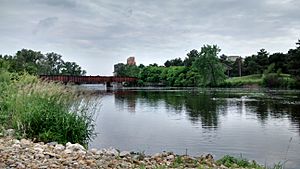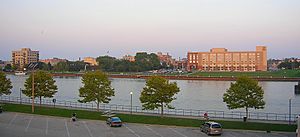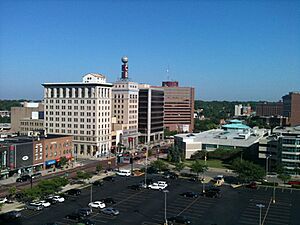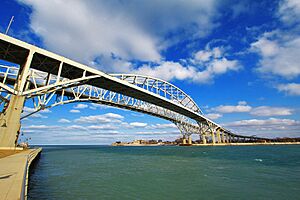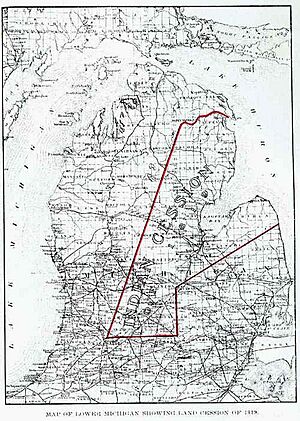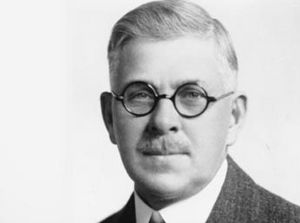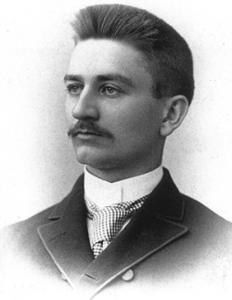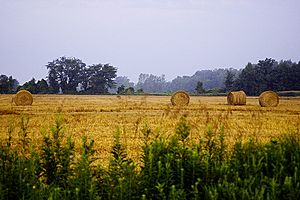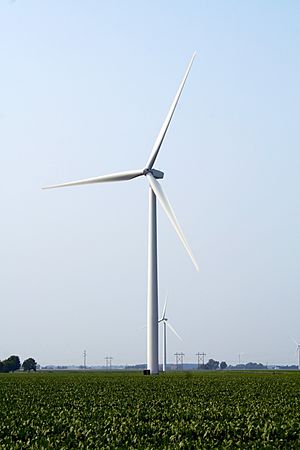Central Michigan facts for kids
Quick facts for kids
Mid-Michigan
Central Michigan
|
|
|---|---|
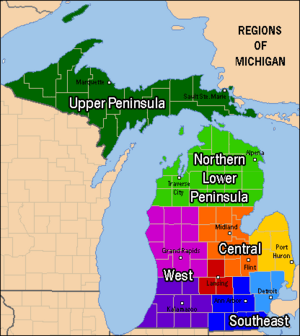
Central Michigan and Mid Michigan describe the same general region of Michigan.
|
|
| Country | United States |
| State | Michigan |
Central Michigan, also known as Mid Michigan, is a special area in the Lower Peninsula of Michigan, USA. Imagine Michigan's Lower Peninsula shaped like a mitten. Mid Michigan is like the "thumb" and "palm" part. It stretches from the eastern shore of Lake Huron inland, across flat, rich farmlands.
This region has cities like Flint, Saginaw, and Lansing, which is the state capital. Generally, Central Michigan is defined as the area north of Jackson and south of Clare.
Contents
Understanding Central Michigan
For the most part, Central Michigan and Mid Michigan mean the same thing. They both describe the middle part of Michigan. However, people sometimes use these names in slightly different ways.
- The Greater Lansing area is sometimes called the Capitol Region. This includes the area around the state capital of Lansing and nearby East Lansing.
- The Greater Tri-Cities area is also known as the Great Lakes Bay Region. It includes the cities of Saginaw, Bay City, and Midland. Sometimes, Mt. Pleasant is also included.
- The Flint area is part of Mid Michigan. It can also be seen as connected to Metro Detroit.
- The Thumb is a peninsula surrounded by Lake Huron on the eastern side of the state. This area is sometimes called the Blue Water Area.
Overlapping Regions
Central or Mid Michigan can sometimes include areas that are also called Southern Michigan. This includes places like Jackson and Hillsdale. These areas are also sometimes considered part of Southeast Michigan.
Parts of Central Michigan can also overlap with Western Michigan. For example, areas in Montcalm County might be seen as part of both regions. The west side of the county, like Greenville, feels more like West Michigan. The eastern parts feel more like Central Michigan.
Some areas may also overlap with Northern Michigan. Places like Clare and Gladwin are on the border. They can be considered part of both regions, depending on how you look at it.
Parts of Metro Detroit can also overlap with Central Michigan. Counties like Genesee and Lapeer are often included in Metro Detroit. However, they are geographically located in Mid Michigan.
Geography and Landscapes
This region has many rivers. These include the Grand River, Red Cedar River, Saginaw River, and Flint River. In Central Michigan, some rivers flow west into Lake Michigan. Others, like the Saginaw River, flow into the Saginaw Bay in Lake Huron.
The land here has rolling hills and flat plains with very rich soil. Farming is very important in the countryside. Farmers grow crops like corn, soybeans, sugar beets, and hay. The region has mostly small towns, but also a few larger cities.
Main Cities in Central Michigan
Central Michigan has several important cities:
- Lansing is the capital of Michigan. It is located right in the middle of the Lower Peninsula. Lansing is the fifth largest city in the state. The Lansing-East Lansing metropolitan area is the third largest metro area in Michigan.
- Flint is the sixth largest city in Michigan. It was once a very important center for Michigan's car industry.
- The Tri-Cities area includes Midland, Bay City, and Saginaw. The Saginaw, Midland, and Bay City metropolitan area is the fifth largest metro area in Michigan.
Counties in Central Michigan
Lansing Area Counties
The Thumb Area Counties
Flint and Tri-Cities Area Counties
History and Culture
Central Michigan has a rich and interesting history. European farmers settled in the countryside. Many different ethnic groups moved to the cities to work in the car industry.
Before European settlers arrived, the Mid-Michigan area was mostly Ojibwe territory. One of the first European settlements was Fort St. Joseph in Port Huron in 1686. After the French and Indian War, more land became open for European settlement. In the 1800s, Lewis Cass signed the Treaty of Saginaw. This treaty gave Ojibwe land to the United States, forming much of Mid-Michigan.
The opening of the Erie Canal brought many settlers to the region. The population grew northward from Ohio. Early settlers cleared the land for the lumber industry. Forests in the Thumb and Saginaw Valley provided much wood for the growing United States. The Saginaw River and its smaller rivers helped transport logs. Logs were floated down to sawmills in Saginaw. From there, they were loaded onto ships and trains. Flint was also a lumber town. The city made carriages and wagons from wood. Later, this industry changed to making automobiles.
Michigan became a state in 1837. The state capital was in Detroit until 1847. The state constitution required the capital to move to a more central and safer location. People were worried about Detroit being too close to British-controlled Canada. The British had captured Detroit in the War of 1812. This led to the need for the government center to be moved away from the border. There was also concern that Detroit, being the largest city, had too much influence.
The Michigan House of Representatives secretly chose Lansing Township as the new capital. When this was announced, many people laughed. They thought Lansing was too small and unimportant. Two months later, Governor William L. Greenly signed the law. This officially made Lansing Township the state capital.
Most people in Central Michigan have European backgrounds since the late 1800s. Many farmers were English and Scots-Irish immigrants. Many of them came from Canada. Other settlers came from eastern states like New York and Pennsylvania. After the forests were cut down, farming became the main activity. Today, corn, soybeans, and sugar beets are grown.
Later, in the 19th and 20th centuries, Polish and German immigrants arrived. They often came through the Detroit area. Many local customs and even the way people speak show these origins. Saginaw County, especially Frankenmuth, is a good example of Bavarian culture in Mid-Michigan. On the eastern side of the region, in St. Clair County, you can find a strong Canadian influence. Huron County in the Thumb has a Polish heritage. Clare is known for its Irish roots.
Michigan's economy changed a lot around 1900. Many smart people helped start the car industry. These included Ransom E. Olds, John and Horace Dodge, and Henry Ford. In Lansing, the Olds Motor Vehicle Company was founded in 1897. Its founder, Ransom E. Olds, later started his new REO Motor Car Company in 1905. This company lasted for another 70 years in Lansing.
In Flint, William C. Durant's Buick became the biggest car maker by 1908. In the same year, Durant founded General Motors (GM). GM moved its main office to Detroit in the mid-1920s. Flint was also the site of an important workers' strike, the Flint sit-down strike.
In 1897, a chemist named Herbert Henry Dow started Dow Chemical in Midland, Michigan. He found a new way to get bromine from underground salt water. Dow Chemical started by selling bleach and potassium bromide. Today, it is one of the largest chemical producers in the world.
Starting in the late 1960s, cities like Flint, Saginaw, and Lansing faced challenges. Many factories closed, and jobs were lost. This led to fewer people living in these cities and some areas falling into disrepair. As car jobs moved away, the cities changed. However, Greater Lansing has become very diverse. This is due to new developments, refugees, and international students at Michigan State University.
Michigan is still a top state for making cars in the U.S. The car industry is mostly in the Midwestern United States, Ontario, Canada, and the Southern United States. Michigan is often ranked high for its Research & development (R&D) spending. Mid-Michigan is home to Michigan State University. This university is a leading research institution. It is part of the University Research Corridor. Michigan's public universities receive over $1.5 billion in research grants each year.
Michigan State University was founded in 1855 in East Lansing. It was the nation's first land-grant institution. The university has been a leader in research and a cultural center for Mid-Michigan. It has made big contributions in farming and pioneered studies in packaging, hospitality business, and communication sciences. Michigan State is often ranked among the top public universities in the U.S. and top research universities worldwide.
Economy and Jobs
Central Michigan's economy mainly relies on farming and some automobile manufacturing.
Farming and Food
Major crops grown here include corn, sugar beets, and soy beans. The Michigan Sugar Company is owned by 1,250 farmers. It has factories in Bay City, Caro, Croswell, and Sebewaing.
There are also many livestock and dairy farms. Koegel Meat Company is in Flint. It makes sausages and processed meats. Lansing-based Quality Dairy Company makes milk and ice cream for the region.
Money and Banks
The largest bank in the region is TCF Financial Corporation, based in Detroit. It is the second largest Michigan-based bank. Citizens Republic Bancorp used to be in Flint. It was bought by FirstMerit Corporation, which was then sold to Huntington Bank. Independent Bank also has a large presence here.
Many local banks and credit unions serve Central Michigan. One of the biggest is Michigan State University Federal Credit Union. It is the largest university-based credit union in the world.
Healthcare Services
McLaren Health Care Corporation is a major employer. It is a non-profit company that runs nine hospitals in Michigan. McLaren's main office is in Flint. It has hospitals in Flint, Lansing, Lapeer, Bay City, Mt. Pleasant, and Port Huron.
Other big healthcare providers include Sparrow Health System in Lansing and Hurley Medical Center in Flint. The Michigan State University College of Human Medicine has locations across the region. The University of Michigan Health System also operates hospitals under the name MidMichigan Health in Clare, Gladwin, Alma, and Midland.
Insurance Companies
Central Michigan, especially the Greater Lansing area, has many statewide and national insurance companies. Auto-Owners Insurance is in Delta Township. It is the largest insurance company based in Michigan. In downtown Lansing, Accident Fund has its headquarters. Jackson National Life is a life insurance company that serves 49 states. It was founded in Jackson but has its main office in Lansing. A smaller company, Frankenmuth Insurance, is based in Frankenmuth.
Manufacturing and Factories
General Motors (GM) operates the Flint Truck Assembly factory in Flint. It also has Powertrain plants in Flint, Bay City, and Saginaw. Until 2004, Mid-Michigan (specifically Lansing) was home to the main Oldsmobile plant for General Motors. That plant is now Lansing Grand River Assembly. GM also runs Lansing Delta Township Assembly in Eaton County.
The world headquarters of Nexteer Automotive, which makes car parts, is in Saginaw. S.C. Johnson and Son has a factory in Bay City that makes Ziploc products. The Dow Chemical Company and Dow Corning have their world headquarters in Midland.
Power Generation
CMS Energy (through Consumers Energy) and DTE Energy (through Detroit Edison) provide much of the electricity for Michigan's Lower Peninsula. CMS operates the Karn-Weadock facility in Essexville. DTE has plants in Harbor Beach, Greenwood Township, and two plants in East China.
The Lansing Board of Water & Light has its own power plants in the Greater Lansing area. The Midland Cogeneration Venture is a partnership in Midland.
Wind farms are a growing source of electricity in this region. Many large wind farms are in Gratiot, Tuscola, and Huron counties. In Lapeer County, DTE Energy owns Michigan's largest solar farm.
International Trade Corridor
The I-69 International Trade Corridor is an important business route. It connects the Midwestern United States with Ontario, Canada. It has many ways to transport goods, like roads, rail, and air. The I-69 International Trade Corridor Next Michigan Development Corporation (NMDC) offers special benefits to businesses. These businesses must use two or more types of transportation and be located within the NMDC area. It is the largest such corporation in Michigan, with 35 city partners.
The counties in this trade corridor are: Shiawassee, Genesee, Lapeer, and St. Clair Counties.
Colleges and Universities
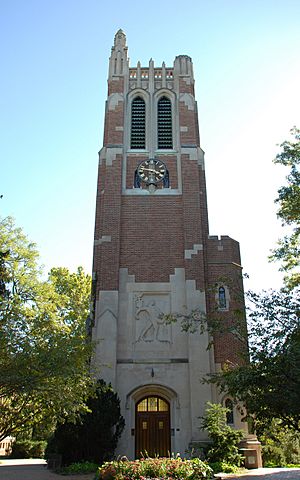
Central Michigan is home to many colleges and universities:
- Central Michigan University in Mount Pleasant
- Michigan State University in East Lansing
- Michigan State University College of Law in East Lansing
- Lansing Community College in Lansing
- Mid Michigan Community College in Harrison and Mt. Pleasant
- Mott Community College in Flint
- Northwood University in Midland
- St. Clair County Community College in Port Huron
- Alma College in Alma
- Olivet College in Olivet
- Saginaw Valley State University in University Center
- Thomas M. Cooley Law School (the nation's largest) is in Lansing.
- University of Michigan–Flint
- Delta College in University Center
- Kettering University in Flint
- Baker College (has campuses across Michigan)
- Davenport University (has campuses across Michigan)
Media and News
Newspapers
The Lansing State Journal is the only daily newspaper in metropolitan Lansing. It is owned by Gannett. Gannett also owns The Times Herald in Port Huron and USA Today. The Flint Journal is available in Flint and Lapeer. It is published four times a week.
Newspapers like the Bay City Times, Midland Daily News, and Saginaw News serve the greater Tri-Cities area. The Times and the Saginaw News are published three times a week. The Midland Daily News is published daily. The Great Lakes Bay Edition is a joint paper focusing on Saginaw, Bay City, and Midland. It publishes once a week. The Hearst Corporation owns the Midland Daily News and the Huron Daily Tribune. Mount Pleasant has a daily newspaper called The Morning Sun.
The Detroit Free Press and The Detroit News are also available throughout the area.
Radio Stations
The region has many radio stations. You can find full lists for specific areas:
- Lansing Area
- Flint Area
- Greater Tri-Cities (Saginaw, Bay City, Midland)
- Thumb Area (Port Huron, Sandusky, Lapeer)
- South Central Michigan (Jackson, Adrian, Hillsdale)
- North Central Michigan (Mt. Pleasant, Cadillac, Alma)
Broadcast Television
Television in Central Michigan varies by area. What stations you can get depends on your antenna signal, cable, or satellite service. In some parts of the region, you can receive broadcasts from all three main markets.
- Lansing/Jackson Market
- Flint/Tri-Cities Market
- Cadillac / Traverse City Market
Transportation and Travel
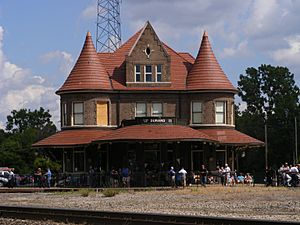
Airports
You can fly from Capital Region International Airport in Lansing. Flights are also available from MBS International Airport near Midland, Michigan and Flint Bishop International Airport. Other parts of the region are close to Gerald R. Ford International Airport near Grand Rapids, Michigan, and Kalamazoo/Battle Creek International Airport near Kalamazoo, Michigan.
Railroads
Passenger train service is offered by Amtrak. It has stations in East Lansing, Durand, Flint, Lapeer, and Port Huron on its Blue Water line.
- The Great Lakes Central Railroad operates from Petoskey to Ann Arbor.
- CSX owns a major line between Detroit and Grand Rapids, passing through Lansing. It also has lines from Toledo to Flint and south of Port Huron.
- Grand Trunk Western Railroad, part of Canadian National, has a busy line between Port Huron and Chicago. It passes through Flint, Durand, and Lansing.
- Mid-Michigan Railroad, owned by Genesee & Wyoming, operates in the Alma area.
- The Huron and Eastern Railway is also owned by Genesee and Wyoming. It has lines north of Durand that go into the Thumb.
- Lake State Railway serves each of the Tri-Cities and extends into Northern Michigan.
Local Transit
- Bay Metropolitan Transportation Authority
- Blue Water Area Transit
- Capital Area Transportation Authority
- Flint Mass Transportation Authority
- Indian Trails
- Saginaw Transit Authority Regional Services
Major Highways
Important roads in the Mid-Michigan area include:
 I-69 runs from Port Huron to Fort Wayne, Indiana. It connects Flint and Lansing.
I-69 runs from Port Huron to Fort Wayne, Indiana. It connects Flint and Lansing. I-75 is a major road connecting the Tri-Cities with Flint and Detroit.
I-75 is a major road connecting the Tri-Cities with Flint and Detroit. I-475 is a business route to downtown Flint.
I-475 is a business route to downtown Flint. I-675 is a business route to downtown Saginaw.
I-675 is a business route to downtown Saginaw. I-94 runs from Port Huron to Chicago. It passes through Detroit, Jackson, and Battle Creek.
I-94 runs from Port Huron to Chicago. It passes through Detroit, Jackson, and Battle Creek. I-96 runs from Grand Rapids to Detroit, passing through Lansing.
I-96 runs from Grand Rapids to Detroit, passing through Lansing. I-496 (R.E. Olds Freeway) is in the Lansing area.
I-496 (R.E. Olds Freeway) is in the Lansing area. US 10 is an east–west road between Ludington and Bay City.
US 10 is an east–west road between Ludington and Bay City. US 23 runs with I-75 through much of the region.
US 23 runs with I-75 through much of the region. US 127 comes from the south, through Lansing. It ends near Grayling. It connects Lansing to Ohio, Kentucky, and Tennessee.
US 127 comes from the south, through Lansing. It ends near Grayling. It connects Lansing to Ohio, Kentucky, and Tennessee. M-13 runs near I-75 in Genesee and Saginaw counties, then into Bay County.
M-13 runs near I-75 in Genesee and Saginaw counties, then into Bay County. M-15 runs north and south through Genesee and Tuscola counties. It ends in Bay City.
M-15 runs north and south through Genesee and Tuscola counties. It ends in Bay City. M-20 is an east–west highway connecting Mt. Pleasant with Midland.
M-20 is an east–west highway connecting Mt. Pleasant with Midland. M-21 runs east and west, similar to I-69 in Genesee County. It connects St. Johns and Owosso.
M-21 runs east and west, similar to I-69 in Genesee County. It connects St. Johns and Owosso. M-24 runs north and south in Lapeer and Tuscola counties.
M-24 runs north and south in Lapeer and Tuscola counties. M-25 follows the outline of the Thumb along the Lake Huron/Saginaw Bay shoreline. It is a scenic drive between Port Huron and Bay City.
M-25 follows the outline of the Thumb along the Lake Huron/Saginaw Bay shoreline. It is a scenic drive between Port Huron and Bay City. M-43 is an east–west highway from South Haven to Webberville. It nearly cuts the Lower Peninsula in half.
M-43 is an east–west highway from South Haven to Webberville. It nearly cuts the Lower Peninsula in half. M-46 is a road that crosses the entire mitten, including the thumb. It runs from Port Sanilac on Lake Huron, through Saginaw, to Muskegon on Lake Michigan.
M-46 is a road that crosses the entire mitten, including the thumb. It runs from Port Sanilac on Lake Huron, through Saginaw, to Muskegon on Lake Michigan. M-52 is a north–south highway connecting Webberville, Perry, Owosso, and St. Charles.
M-52 is a north–south highway connecting Webberville, Perry, Owosso, and St. Charles. M-53 (Van Dyke Road) is a route to the Thumb of Michigan. It takes vacationers to resorts and cottages on Saginaw Bay and Lake Huron.
M-53 (Van Dyke Road) is a route to the Thumb of Michigan. It takes vacationers to resorts and cottages on Saginaw Bay and Lake Huron. M-54 Dort Highway is a main road into Flint. It runs near I-475, then follows I-75 to Birch Run.
M-54 Dort Highway is a main road into Flint. It runs near I-475, then follows I-75 to Birch Run.
Famous People from Central Michigan
This list includes some well-known people from the region. More detailed lists can be found for individual cities.
From Lansing
- Jim Cash - Screenwriter for Top Gun
- Thom Hartmann - Radio talk-show host and author
- Magic Johnson - Famous NBA basketball star
- John Hughes - Film director
- Larry Page - Co-founder of Google.com
- Ransom E. Olds - Car manufacturer; founded Olds Motor Vehicle Company
- Burt Reynolds - Actor
- Steven Seagal - Actor
- John Smoltz - MLB baseball star and 1996 Cy Young Award winner
- Debbie Stabenow - U.S. Senator
- Stevie Wonder - Singer, attended the Michigan School for the Blind in Lansing (born in Saginaw)
- Malcolm X - Human rights activist
From Tri-Cities and Flint
- Michael Moore - Filmmaker and author from Davison.
- Robert Armstrong - Actor, known for King Kong
- Warren Avis - Founder of Avis Rent A Car
- Betsy Brandt - Actress, Breaking Bad
- Madonna - Famous singer and actress, born in Bay City
- Bill Hewitt - Pro Football Hall of Fame player
- Terry McDermott - Olympic gold medalist in speed skating (1964)
- George Kid Lavigne - Boxer, world lightweight champion (1896)
From The Thumb Area
- Thomas Edison - Famous inventor, lived in Port Huron from 1854 to 1863.
- Brewster H. Shaw - Retired Air Force colonel and former NASA astronaut from Cass City.
- Frank Murphy - Detroit mayor, Michigan governor, and Justice of the United States Supreme Court, born in Harbor Beach.
- Marguerite de Angeli - Children's book author, Newbery Award winner
- Jake Long - Offensive lineman for the Miami Dolphins
- Terry McMillan - Award-winning author of Waiting to Exhale
 | Ernest Everett Just |
 | Mary Jackson |
 | Emmett Chappelle |
 | Marie Maynard Daly |


